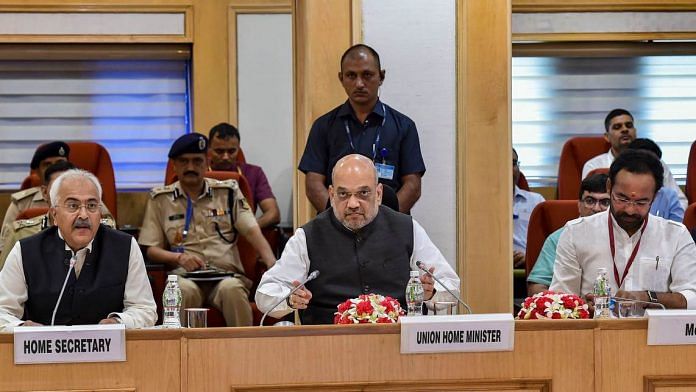New Delhi: Union Home Minister Amit Shah on Monday reviewed ongoing operations against Naxals and development initiatives being undertaken in Left Wing Extremism affected areas, officials said.
Chief ministers Nitish Kumar (Bihar), Naveen Patnaik (Odisha), Yogi Adityanath (Uttar Pradesh), Kamal Nath (Madhya Pradesh), Raghubar Das (Jharkhand), Bhupesh Baghel (Chhattisgarh) besides top police and civil officials of 10 Naxal affected states attended the meeting.
“The home minister reviewed ongoing operations against Naxals and the development activities undertaken in Naxal affected areas,” a home ministry official said.
Top officials of paramilitary forces and the home ministry also attended the meeting, first of its kind after Shah assumed charge as home minister about three months ago.
The 10 Maoists-hit states are Chhattisgarh, Jharkhand, Odisha, West Bengal, Bihar, Maharashtra, Telangana, Andhra Pradesh, Madhya Pradesh and Uttar Pradesh.
According to Home Ministry statistics, 8,782 cases of Naxal violence were reported during 2009-13 as against 4,969 during 2014-18, a reduction of 43.4 per cent.
As many as 3,326 people, including security force personnel, lost their lives in 2009-13 as against 1,321 in 2014-18, a reduction of 60.4 per cent, the ministry said.
1,400 Naxals were killed during 2009-2018. As many as 310 incidents of Naxal violence have been reported in the first five months of this year across the country in which 88 people were killed.
Union Minister of State for Home G Kishan Reddy had said last month that steadfast government policy has resulted in consistent decline in violence and shrinkage in geographical spread of Left Wing Extremism (LWE).
LWE-related violence was reported in only 60 districts in 2018.
“Of these, only 10 districts account for 2/3rd of LWE violence. The LWE-related incidents of violence between April 2014 to May 2019 have been 43 per cent lesser when comparing with the preceding five-year period,” he said.
The National Policy and Action Plan, approved in 2015 to address LWE, envisages a multi-pronged strategy involving security-related measures, development interventions, ensuring rights and entitlements of local communities.
The government is also implementing a special central assistance for most LWE-affected districts with an annual outlay of Rs 1,000 crore to fill critical gaps in public infrastructure and services.
Also read: Modi was BJP’s PM choice because Rajnath Singh made sure of it






